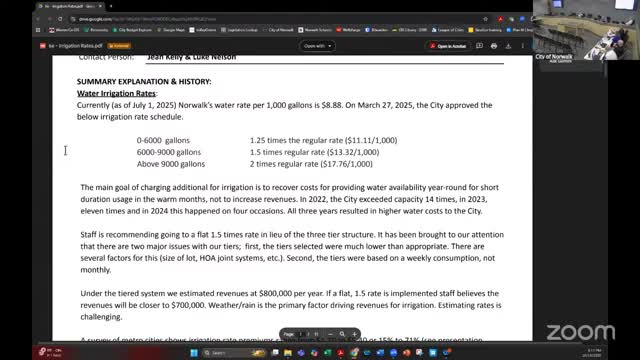Norwalk Council approves first reading to simplify irrigation rates, staff and council warn it won’t fully cover costs
October 17, 2025 | Norwalk City, Warren County, Iowa
This article was created by AI summarizing key points discussed. AI makes mistakes, so for full details and context, please refer to the video of the full meeting. Please report any errors so we can fix them. Report an error »

The Norwalk City Council on Oct. 16 approved the first reading of an ordinance to change the city’s irrigation water charges from a three-tier structure to a flat 1.5-times multiplier of the base water rate.
City staff told council the change is meant to address consequences from the earlier tiered schedule, in particular the impact on homeowners associations (HOAs) that serve many homes through a single irrigation meter. Luke, a city staff member who reviewed HOA usage, said HOAs frequently were pushed into the highest tier and “were being penalized because they were a larger group altogether.”
Jean, a city staff member presenting the ordinance, said the tier levels chosen earlier were “probably too low” and that moving to a flat rate would treat all irrigation users the same and remove the HOA-versus-individual-meter dilemma. Jean told council the city currently has about 1,268 irrigation meters.
Staff estimated irrigation revenue under the pre-change tiered structure would have been about $800,000 in a normal year. Under the proposed flat 1.5x rate, staff estimated roughly $700,000 in revenue based on 2024 usage — a shortfall of about $100,000 compared with the previous projection. Jean said the proposed rate “would not cover 100% of the cost” of irrigation but was intended as a reasonable step while metro cities and the Central Iowa Water Works work through longer-term changes.
Council members pressed staff for detail on how much of that revenue difference was attributable to HOAs. Staff said roughly 517 housing units are served by HOA irrigation meters; depending on usage patterns, the added annual cost to those HOAs under the tier structure ranged from about $6,200 to as much as $62,000 across the city. Staff also noted that HOAs with many homes sometimes operate their irrigation systems more efficiently, and when the HOA meters were hypothetically broken into individual meters under the tiered system the city’s analysis showed those occupants would have paid less overall.
Council discussion also addressed longer-term options beyond rate-setting: installing separate nonpotable distribution (“purple pipe”) systems for irrigation, requiring or encouraging separate indoor/outdoor meters, or metro-wide controls such as restrictions on frequency of watering and technology-based irrigation controls. Several council members said they preferred education and regional coordination with Central Iowa Water Works rather than prescriptive local watering bans.
The ordinance passed its first reading on a roll call vote. During the roll call, council members recorded: Brown — yes; Poole — yes; Livingston — no; Vinings — yes. Council members indicated the item would be revisited and that staff would monitor metro policy changes and 2025 usage data before returning with further recommendations.
What’s next: the ordinance was approved on first reading; council members said they expect to review the rate again after additional metro-wide decisions and updated local consumption data.
City staff told council the change is meant to address consequences from the earlier tiered schedule, in particular the impact on homeowners associations (HOAs) that serve many homes through a single irrigation meter. Luke, a city staff member who reviewed HOA usage, said HOAs frequently were pushed into the highest tier and “were being penalized because they were a larger group altogether.”
Jean, a city staff member presenting the ordinance, said the tier levels chosen earlier were “probably too low” and that moving to a flat rate would treat all irrigation users the same and remove the HOA-versus-individual-meter dilemma. Jean told council the city currently has about 1,268 irrigation meters.
Staff estimated irrigation revenue under the pre-change tiered structure would have been about $800,000 in a normal year. Under the proposed flat 1.5x rate, staff estimated roughly $700,000 in revenue based on 2024 usage — a shortfall of about $100,000 compared with the previous projection. Jean said the proposed rate “would not cover 100% of the cost” of irrigation but was intended as a reasonable step while metro cities and the Central Iowa Water Works work through longer-term changes.
Council members pressed staff for detail on how much of that revenue difference was attributable to HOAs. Staff said roughly 517 housing units are served by HOA irrigation meters; depending on usage patterns, the added annual cost to those HOAs under the tier structure ranged from about $6,200 to as much as $62,000 across the city. Staff also noted that HOAs with many homes sometimes operate their irrigation systems more efficiently, and when the HOA meters were hypothetically broken into individual meters under the tiered system the city’s analysis showed those occupants would have paid less overall.
Council discussion also addressed longer-term options beyond rate-setting: installing separate nonpotable distribution (“purple pipe”) systems for irrigation, requiring or encouraging separate indoor/outdoor meters, or metro-wide controls such as restrictions on frequency of watering and technology-based irrigation controls. Several council members said they preferred education and regional coordination with Central Iowa Water Works rather than prescriptive local watering bans.
The ordinance passed its first reading on a roll call vote. During the roll call, council members recorded: Brown — yes; Poole — yes; Livingston — no; Vinings — yes. Council members indicated the item would be revisited and that staff would monitor metro policy changes and 2025 usage data before returning with further recommendations.
What’s next: the ordinance was approved on first reading; council members said they expect to review the rate again after additional metro-wide decisions and updated local consumption data.
View full meeting
This article is based on a recent meeting—watch the full video and explore the complete transcript for deeper insights into the discussion.
View full meeting
